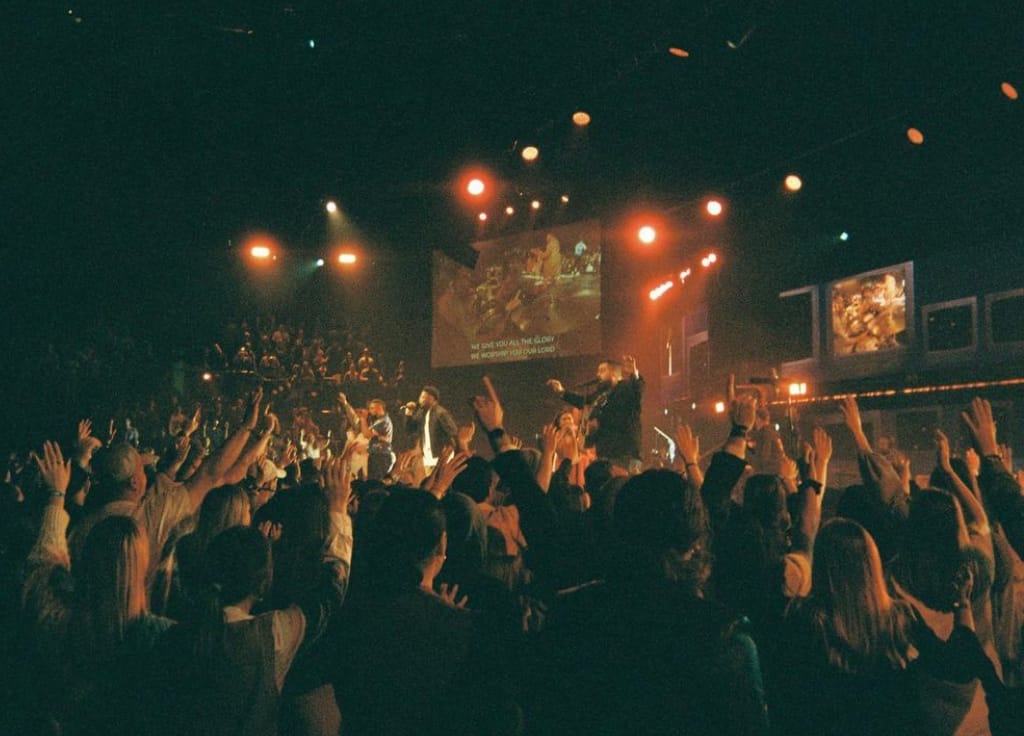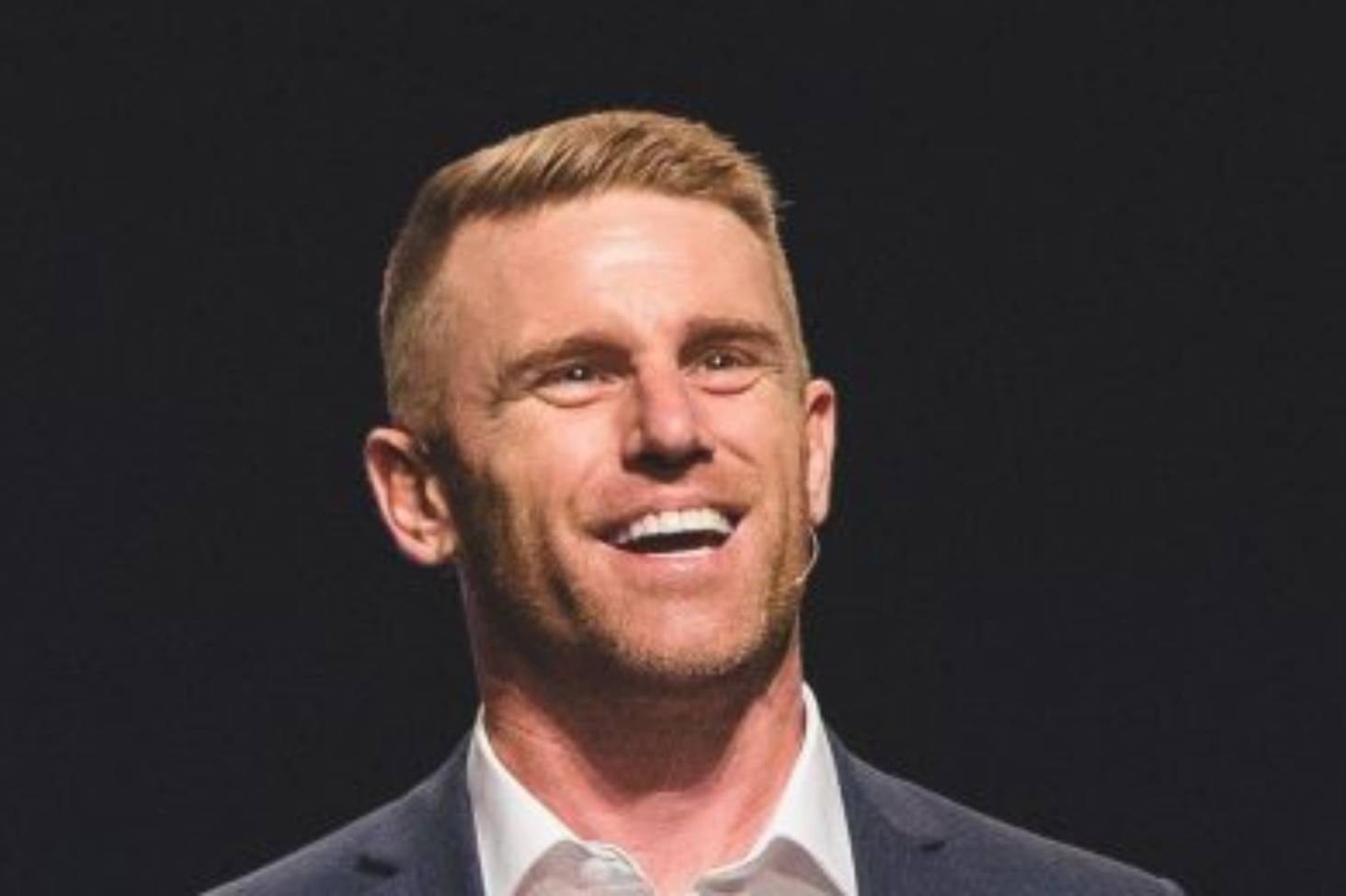Understanding Megachurch Culture
From the inside out... 18 Years at Arise Church

Hi,
Since I’ve started reporting on the Arise megachurch, I’ve fielded a number of questions.
Some of those are along the lines of “If people were so unhappy — why didn’t they just leave?” and “why didn’t anyone speak up until now?”
I wanted to address questions like this, by revisiting a woman I spoke to in an earlier piece.
She started attending Arise when the church was just four months old — going on to work there in a variety of roles over 18 years.
She resigned from staff in 2015 due to a mental breakdown, but left properly in 2021 after “finally allowing myself permission and space to ask questions I thought were off limits and ‘wrong’.”
She knows Arise Church from the inside out. She knows what the culture of a megachurch looks like — beyond the raised hands and pyrotechnics.

Because there’s a reason these stories keep coming out of Arise. There’s a reason I am hearing from so many former members of other megachurches like City Impact, Life, and Hillsong.
The problems are built into the churches’ DNA.
These large megachurches function in a very specific way — from the particular parts of the Bible they choose to focus on, to the structure of their leadership and boards.
And they have each other’s backs: Peter Mortlock of City Impact megachurch posted a series of videos on his Instagram this week, defending Arise: “We are on the same team, and I will encourage, support and endeavour to speak up for them.”
To be clear: Mortlock isn’t speaking up for the victims. He’s speaking up for John Cameron.

So today I have a story from someone who knows megachurch culture all too well.
Her story helps answer those questions I keep getting, and it hints at why Arise’s John Cameron hasn’t felt the need to resign during the independent investigation and HR review. Why the Arise Board says John “remains an important part of the Arise family”.
This is an insight into the culture of a megachurch from someone who made it their life for nearly two decades.
It speaks to a culture that’s difficult to grasp unless you’ve been a part of it.
This is her story, in her words.
David.
Honour Your Leader
“For as long as I can remember, we were indoctrinated with an “honour culture”.
We were constantly told to “build towards John and Gillian”, and not ourselves.
The goal in any connection we made with people was to make them feel some kind of attachment to the Camerons, even though they would most likely never meet each other.
Flowers, meals and gifts would be given to people in times of celebration or crises “from John & Gillian”, but purchased with church funds and delivered by a staff member, intern, leader or volunteer.
We were taught to “presence” John and Gillian in our meetings and conversations, by talking about their heart or mentioning anything positive they may have said about the person, or people, involved.
If anything negative was said by anyone about the Camerons or Arise, we were trained to protect them, to “take the hit” for our senior pastor.
To paint them in a positive light, always.
This is exactly what I see happening in real time, as senior leadership go radio silent and the campus pastors and other leadership stand on the front line, taking hit after hit. There is much we have all been complicit in, myself included. But a lot of these hits are not theirs to take.
This is a huge reason I think John hasn’t resigned — because a crowd of people don’t think he should. Because he can do no wrong in their eyes. Because if he does something that looks remotely “right” — like statements and posts that sound on the very surface like humility and remorse. They won’t question it further.
I also think if John resigns there is the very real possibility that Arise will crumble.
It has been built around one man, and if that one man no longer stands at the helm, then I wonder what else will be left to hold it up.”
Church Governance
“A common theme across a lot of these megachurches is the total lack of accountability.
Within the Western pentecostal megachurch stream, the way the Arise Board is structured is super common. These churches run off secular business principles, but what they lack — which is present in the business world — is robust accountability.
Governance is not talked about much, except when John says from the stage that we have a board who has the power to fire him. What he has failed to mention is that it would require a majority vote to fire him.
And until a couple of weeks ago, John and his brother Brent made up 50% of the vote.”
Note: See my last piece about the board rules and structure, and how John Cameron had approval of who replaced him and his brother, despite no longer being on the board.
“John said on many many occasions to the staff that he didn’t want a group of sycophants or yes-men. He said he valued robust discussion and disagreements to enable his decision-making process.
Of course this is not what evidence would show. Many of the issues raised in these recent articles are not new, and certainly would not have come as a surprise to those in the top sphere of leadership. Perhaps the surprise is in the sheer volume of people now speaking out, and the noise that has been created.
If questions are asked, they are deflected. If problems are raised, the narrative on repeat is “yes we are aware of that, but things are changing”. If people continue to push back, they are either given more promotions and pulled closer in, or pushed out into the cold.
I have been hearing about this “change” for years now, and am still waiting to see change that is meaningful — change to the very fabric of the culture.”
One Way to Think
“Unity is one of Arise’s key values that is on repeat in pretty much any Arise environment you find yourselves in.
What is really meant by “unity” is uniformity: Don’t ask questions. Don’t step out of line. Fit the cookie-cutter mould.
The result of this is a whole group of people who don’t know how to think critically for themselves, and who will buy into whatever is preached to them from the platform.
A number of years ago a group of young guys in their late teens and early twenties started to meet together to look at the theology around tithing. This group was squashed immediately by leadership, and the guys who didn’t get in line eventually ended up leaving the church.
I was told by John to meet with the younger sister of one of the guys involved — to make sure she didn’t start asking questions too.
She was probably about 17 at the time.
I told John I was planning to tell her to read the Bible and find the answers for herself. His response was that that was a terrible idea — I needed to sit with her and make sure she knew what scriptures specifically to read and essentially tell her what the “right” way was to think.
My brother and sister-in-law, who left Arise two years ago, began doing some theological research themselves. A friend was highly concerned that my sister-in-law wasn’t sure if she believed in a literal seven day creation, and “uplined” this to leadership.
My brother and his wife then were asked to have dinner with their campus pastors, where they were told what books and theologians they should read — and what people within Arise were safe for them to talk to.”
Indoctrination
“John preached many of the same messages on repeat for years.
During my 18 year tenure there, I couldn’t even tell you how many times I heard and absorbed his many mantras: “Changed lives change lives.” “We are a hang out church.” “Mediocrity shouts contempt to God.”
“Just smile and wave.”
“I am responsible.”
“Love, grow, give, smile, unite, excel, Arise.”
What I can tell you is that they stick — and without realising — become doctrine. People don’t question or challenge any of this stuff, because to them it is as true as the gospel we believe. It has been rammed into their psyche.
People have been indoctrinated with toxic positivity, with “honour”, with “unity”, and with building the vision God has given to John: Arise.
So when it comes to bringing critique, talking about wounds and toxicity within the culture, there is no space to be heard.
We are not to touch them, to tear them down, to question or expose them.
On the flipside, we hear no teaching whatsoever about Jesus publicly confronting the Pharisees, flipping tables in a corrupt temple, and taking the side of the oppressed and marginalised.”
A Growth Game: “Eagles instead of Turkeys”
“Numerical growth is everything. Of course it is all in the name of the glory of God and expanding God’s kingdom.
Perhaps an important thing to note is that John often said from the platform that we are not about numbers; we are not about bums on seats — we are about “the one”, the individual person.
However, behind the scenes it’s a very different picture.
The growth of Arise is sold as the most important mission, and people will do whatever it takes to see this happen.
They will drive themselves to burnout.
University students will drop out of their degree half way to do an internship, despite contrary advice from family members and other people outside of Arise who care about them. Marriages and families will be put under immense pressure. And people will be misused and mistreated.
If someone is no longer part of Arise, it is not uncommon for friends to cease contact because they aren’t seen as building towards the same goal, the mission of God to transform a nation.
And if someone has nothing of supposed value to offer Arise — like talents, resources, and influence — then these are certainly not the people John would be spending time or energy on.
Successful business people, professional athletes, young hip charismatic guys with potential to be the next Arise pastor — these are who John spends his time with.
And Arise leaders are taught to do the same. “Everyone deserves your touch but not your time” is a common phrase we were taught: Have a short conversation with anyone by all means, but don’t waste your time with them if they don’t have something that is going to build the institution.
We were taught the “90-10 principle”: spend 90% of your time with 10% of the people — and vice versa.
The people we were taught to spend the majority of our time with were those who could “build Arise”. Those who didn’t have much to offer, but who perhaps displayed a keenness to be involved, were often described as “low-hanging fruit” — easy to pick, but not the best quality.
I know of leaders who were reprimanded for spending their time with the wrong people, and told to go for “eagles” instead of “turkeys”.
This is where people are treated as commodities, sucked in and spat back out.
This is where so much wounding takes place.”
Arise is your Entire World
“People are taught that ultimately what they do in this life only has real value if it’s building their local church.
John routinely shares a story in his sermons about a moment that changed the trajectory of his life: He arrived at work one morning — probably about three decades ago when he was working in insurance in Auckland — to discover a pool of blood on the doorstep.
He put this pool of blood down to a person who must have been injured in the night, and found themselves in a pretty desperate spot.
John was incredibly moved by this, and as the story goes, he sat at his desk trying to figure out what to do about fixing this.
His conclusion was that social work, government, and education won’t cause deep change in these broken places of society.
Instead, he concluded that “the local church is the hope of the world.” And in his journal that day he wrote “I will live and I will die for the local church”.
He then continues the story by telling us from that moment he committed to full-time Christian ministry, and ever since has committed to doing only that.
This story reinforces the idea that the brokenness in our world is healed by the local church, the institution. And it is in us working for the institution that we will see the brokenness in our world eradicated.
The result is this: people from all walks of life come in to Arise, hear this narrative, and get involved. To the point of burn out. Because this is what really matters.
People give up friendships. University students decide to stay in Wellington to keep serving at church over summer instead of spending time with their families.
As a staff we would look positively on university students who chose to stay in Wellington instead of going home to their families during the summer break: we would think it was a healthy thing that they felt more connected to Arise than to their own family.
Volunteers are told they shouldn’t be out of town on weekends, because Sundays are “Game Day”. People miss out on key family events and celebrations because they have been taught Arise services and events are more important.
A staff member lost his job because he was not given leave to attend a close friend’s wedding which was taking place out of town over the weekend — but chose to go anyway.”

Leaving Arise
“To leave Arise becomes a hugely complex ordeal.
It is not as simple as seeing something you’re not happy with and leaving. It is making the decision to leave your community, your support system, your identity, your world.
It is also not a simple thing to see what it is that you’re actually unhappy with.
My experience — and the experience of so many others — is that we felt uncomfortable with things over the years, but struggled to put our finger on exactly what those things were.
We were taught not to ask questions, because in essence to question or disagree with our leaders was to dishonour them, and thus to sin against God. And so many — like myself — have gone along for years, not allowing ourselves the freedom to ask ourselves “What do I really think about this? What does the Bible really have to say? What do I truly value?”
Many try to leave staff, and are offered “promotions” or “better roles” to entice them to stay. For others, to leave staff isn’t even an option, because that would be stepping outside of God’s purpose for your life.
For me, it required months of panic attacks, a mental breakdown and suicidal ideation to get me to finally resign back in 2015.
And it took a global pandemic and a year of postnatal depression to allow myself the space to be truly honest with myself about the things that troubled me at Arise, and begin the journey of taking the lid off.
When you are on the inside, it is like you are trapped inside a bubble. You can’t see things clearly, and it is only upon getting distance from it all that your perspective clears a little.
Inside the “bubble”, you think the same, talk the same, act the same.
Outside the bubble, you realise there is so much more to life — and even so much more to the gospel of Jesus — that you were never shown or encouraged to seek out for yourself.”

The Suffering Messiah
“A friend described it like this: “Arise is God, and John is our suffering Messiah.”
I have been pretty concerned to see the amount of people in support of John say “Arise saved my life.” As a follower of Jesus, I don’t think any organisation can save anyone — and I think most Christians would agree that this is absolutely heretical.
If someone is attending Arise, and thinks it is Arise that has saved them, then we haven’t built the house of God at all: We have built a temple to a man. And this is exactly why this thing feels and sounds eerily like a cult.
John managed to dismantle my personhood, and the personhood of many others. To this day I feel myself kick into fight or flight mode just at the thought of seeing him. I felt unable to think for myself in his presence, going along with whatever he said whether or not it aligned with what I truly valued.
John seems to function on a reward-punishment system of sorts. He was either overwhelmingly encouraging and positive, or angry, annoyed, frustrated. We walked on eggshells around him, not knowing which John we were going to get. For people who did anything on stage in Arise services, we were all very familiar with “the face”.
John had a very angry facial expression that we would commonly see during worship time. He would be angry about any number of things: the temperature in the room, the quality of sound, the appearance of the worship team, the way the ushers had distributed seating. We lived in fear of him.
When John was away from a service, it seemed like the relief was tangible. We lived for his approval, we were terrified of his displeasure.
I am a fairly compliant person in general, and rarely ever spoke up or challenged John. On the occasions that I did, I was made to feel like I was the problem.
I don’t trust myself, even now as a 37-year-old woman, to be able to think for myself should I find myself in a room with him.”
Looking at how Arise functions — from the top down — it’s unclear how anything can change, no matter what any independant review tells them.
Because the stories coming out of Arise are caused by the very DNA of the megachurch.
It’s what these places are all about: Money, control, repression, purity, perfection. Things that make humans — messy, complicated creatures — break.
There’s a reason I now have over 500 pages of emails from those spat out the other side of megachurch culture. Stories of trauma, pain, and self-hatred.
For these stories of hurt to stop — the entire structure of the megachurch has to change.
That’s certainly the case with Arise — including its obsession with one man, whose name most certainly isn’t Jesus.
David.
If you’re new here, or missed the update — there’s now an app you can read Webworm on. I’ve linked to it below.
You can also share today’s piece — it’s www.webworm.co/p/messiah
All my megachurch reporting so far is found here: www.webworm.co/p/megachurch

Read Webworm with David Farrier in the Substack appAvailable for iOS and AndroidGet the app
This is a really good podcast episode on what I’ve been writing about: Another Level: The Megachurch Playbook. It’s from a show called In The Shift, a podcast from Michael Frost — a former member of large megachurch, who managed to break away from the system (while still keeping some “faith and spirituality”). The discussion here, between two recovering megachurch members, is nuanced and fascinating.
I also highly recommend this Instagram meme page set up by ex-Arise interns, @AriseAlumni. They’re processing their trauma through humour — and their archived stories contain countless examples of a broken and disturbed culture at Arise.





